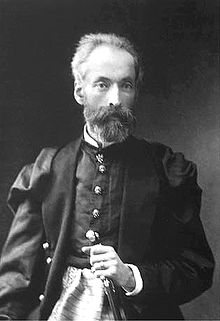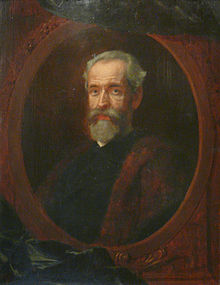| Władysław Czartoryski | |
|---|---|
 Prince Władysław Czartoryski Prince Władysław Czartoryski | |
| Coat of arms | Czartoryski coat of arms |
| Born | (1828-07-03)3 July 1828 Warsaw, Congress Poland |
| Died | 23 June 1894(1894-06-23) (aged 65) Boulogne-Billancourt, France |
| Noble family | Czartoryski |
| Spouse(s) |
(m. 1855; died 1864) (m. 1872; died 1893) |
| Issue | August Czartoryski Adam Ludwik Czartoryski Witold Kazimierz Czartoryski |
| Father | Adam Jerzy Czartoryski |
| Mother | Anna Zofia Sapieha |
Prince Władysław (Ladislaus) Czartoryski (3 July 1828 – 23 June 1894) was a Polish noble, political activist in exile, collector of art, and founder of the Czartoryski Museum in Kraków.
Early life

Czartoryski was born in Warsaw, Congress Poland, on 3 July 1828. He was a son of Prince Adam Jerzy Czartoryski and Princess Anna Zofia Sapieha. His father began his political career as a Foreign Minister to the Russian Tsar Alexander I after Poland was partitioned by Russia, Prussia and Austria. He later became the 1st President of the Polish National Government in exile and a bitter opponent of Alexander's successor, Tsar Nicholas I. His elder brother was Prince Witold Czartoryski and his younger sister was Princess Izabella Elżbieta Czartoryska, who married Count Jan Kanty Działyński (son of Tytus Działyński).
His paternal grandparents were Prince Adam Kazimierz Czartoryski and Izabela Flemming. His maternal grandparents were Prince Aleksander Antoni Sapieha and Anna Zamoyska.
Career

Prince Władysław was an activist of the Hotel Lambert. From 1863 to 1864 he was the main diplomatic agent of the revolutionary National Government (Rząd Narodowy) with the English, Italian, Swedish and Turkish governments.
He was also owner of the family's outstanding collection of art: paintings, sculptures and antiquities. He was greatly interested in Egyptian art, making his purchases at sales in Paris and directly in Egypt. He donated some objects to the Polish Library in Paris and also other archeological artifacts to the Jagellonian University. In 1871, he donated objects to the Polish Museum in Rapperswil, Switzerland.
In 1865, he organized an exhibition of the "Czartoryski Collection" in the "Polish Room" of the Exposition des Arts Decoratifs in Paris. In 1878, he reopened the Czartoryski Museum in Kraków, founded by his grandmother Izabela Czartoryska in 1801 in Puławy but closed after the November Uprising.
Władysław hoped that his eldest son would pursue a diplomatic career, however, Gucio went against his father's wishes and joined the religious order of the Salesians. Gucio was ordained a priest in 1893, but neither his father nor anyone else in the family attended the ceremony, and he died a year later of tuberculosis at the age of 34. Gucio was beatified in 2004.
Personal life

On 1 March 1855, Czartoryski married María Amparo Muñoz, 1st Countess of Vista Alegre, in Malmaison near Paris. She was a daughter of Queen Maria Christina of Spain by her morganatic second marriage to Agustín Fernando Muñoz, Duke of Riánsares. They lived at the Hôtel Lambert, the Czartoryski family's base of operations during the Second French Empire. Before her death from tuberculosis in 1864, they were the parents of:
- Blessed August "Gucio" Czartoryski (1858–1893), who contracted tuberculosis at the age of six from his mother, who died soon thereafter; his tutor was Joseph Kalinowski (who became Saint Raphael) and he joined the religious order of the Salesians.
On 15 January 1872 Prince Władysław married his second wife, Princess Marguerite Adelaide of Orléans, daughter of the Duke of Nemours and granddaughter of King Louis-Philippe of France, with whom he had two more sons:
- Adam Ludwik Czartoryski (1872–1937), who married Countess Maria Ludwika Krasińska, a daughter of Princess Madeleine Radziwiłł.
- Witold Kazimierz Czartoryski (1876–1911), who left his estate to his elder brother.
He died on 23 June 1894 in Boulogne-sur-Seine and was buried in the Sieniawa family crypt.
See also
References
- Frederic, Harold (2 November 1891). "AN INDICTMENT OF RUSSIA; INSIDE HISTORY CONCERNING THE CZAR ALEXANDER III. A BORN "POTTERER," WITH NO IDEA OF SYSTEM AND NO EXECUTIVE TALENT -- HIS COMICAL OBJECTION TO WAR -- RUSSIAN IGNORANCE OF THEIR OWN RULER". The New York Times. Retrieved 24 February 2023.
- Doyen, Charles; Willocx, Louise (7 January 2021). Pondera Antiqua Et Mediaevalia I. Presses universitaires de Louvain. p. 32. ISBN 978-2-39061-082-3. Retrieved 24 February 2023.
- "OBITUARY". The New York Times. 1 November 1891. Retrieved 24 February 2023.
- Rampley, Matthew; Prokopovych, Markian; Veszprémi, Nóra (25 February 2021). The Museum Age in Austria-Hungary: Art and Empire in the Long Nineteenth Century. Penn State Press. p. 54. ISBN 978-0-271-08904-1. Retrieved 24 February 2023.
- ^ Aldrich, Mildred (20 October 1901). "THE FAMOUS HOTEL LAMBERT IN PARIS; The Future Home of Prince Adam Czartoryski and His Bride. . . ". The New York Times. Retrieved 24 February 2023.
- "PRINCESS DOLORES ENGAGED TO MARRY; Niece of French Pretender Will Be the Bride of Prince Auguste Czartoryski". The New York Times. 9 March 1937. Retrieved 24 February 2023.